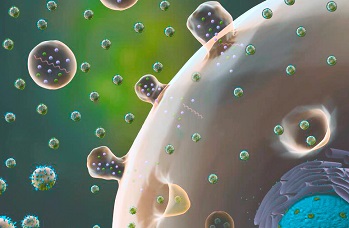University of Pittsburgh Study Reveals Potential Breakthrough in Treating Viral-Induced Pulmonary Inflammation.
Medical News: Matrix-Bound Nanovesicles (MBV) - Pulmonary Inflammation May 23, 2023 1 year, 10 months, 3 weeks, 1 day, 12 hours, 38 minutes ago
Medical News: In a groundbreaking study conducted at the McGowan Institute for Regenerative Medicine at the University of Pittsburgh, researchers have discovered that Matrix-Bound Nanovesicles (MBV) hold promising potential in mitigating pulmonary inflammation caused by flu viruses and SARS-CoV-2. This finding could revolutionize the treatment of viral-mediated inflammatory diseases, offering new hope in the fight against respiratory infections.

The study focused on cytokine storm, a severe inflammatory syndrome characterized by elevated levels of proinflammatory cytokines and immune cell hyperactivation, which often leads to multi-organ dysfunction and failure.
Cytokine storm is a critical factor in the progression of diseases such as influenza and the coronavirus disease 2019 (COVID-19). With the SARS-CoV-2 pandemic still ongoing, finding effective treatments for cytokine storm and its associated complications has become a top priority.
Matrix-bound nanovesicles (MBVs) are a unique subclass of extracellular vesicles found in the extracellular matrix (ECM). These nanovesicles possess immunomodulatory properties and have been shown to down-regulate proinflammatory immune responses in previous studies. They contain anti-inflammatory microRNAs, proteins, and lipids, making them potential candidates for therapeutic interventions.
The study team aimed to evaluate the efficacy of MBV in treating acute respiratory distress syndrome (ARDS) and cytokine storm induced by influenza viruses. They used a murine model and administered MBVs intravenously following viral inoculation. The results were remarkable.
The administration of MBVs significantly reduced lung inflammation, the frequency of proinflammatory macrophages, and the levels of proinflammatory cytokines. At both 7 and 21 days after viral inoculation, the total lung inflammatory cell density was decreased, along with the proportion of lung undergoing inflammatory tissue repair. Moreover, MBVs stimulated the activation of anti-viral CD4+ and CD8+ T cells, suggesting an enhanced immune response against the viral infection.
Corresponding author, Dr Stephen F. Badylak from the Department of Bioengineering, University of Pittsburgh, told Thailand
Medical News, "These study findings demonstrate the immunomodulatory properties of MBVs and their potential therapeutic benefit in treating pulmonary inflammation caused by influenza viruses and other viral diseases, including SARS-CoV-2.”
Cytokine storm and ARDS associated with viral infections have been challenging to treat effectively. Current therapeutic strategies mainly focus on supportive care and immunosuppression, but these approaches can have drawbacks, including immunosuppression-associated sequelae and compromised immune system function. MBVs offer a new avenue for immunomodulatory therapies that can facilitate the host response to viral infections without compromising the entire immune system.
The study's findings align with the growing interest in extracellular vesicle-based therapies for managing viral-mediated cytokine storms and ARDS. Since the onset of the COVID-19 pandemic, numerous clinical trials have been launched to explore the p
otential of EV-based therapies against SARS-CoV-2. Although most of these trials focus on safety and pharmacodynamics, there is mounting evidence supporting the immunomodulatory role of EV therapies in mitigating viral-induced lung inflammation.
Previous studies have demonstrated the ability of MBVs to down-regulate proinflammatory immune responses and improve outcomes in various disease models, including ocular injury, rheumatoid arthritis, and heart transplant rejection. Additionally, MBVs have shown minimal systemic and immune toxicity in vivo, making them promising candidates for therapeutic applications.
One of the crucial aspects of MBV therapy highlighted in the study was the restoration of immune homeostasis. The delicate balance between proinflammatory and anti-inflammatory components of the immune system is crucial for maintaining tissue health. Dysregulation of this balance leads to pathological conditions, including cytokine storm. MBVs have the unique ability to regulate immune-stromal cross-talk and promote an anti-inflammatory macrophage phenotype without compromising immune competence.
While the study showed promising results, several areas require further investigation. The specific molecular mechanisms responsible for MBV's immunomodulatory effects remain largely unknown. Additionally, the study used MBVs isolated from porcine urinary bladder, and future research could explore the potential benefits of MBVs derived from different tissue sources.
Further studies are also necessary to determine the optimal timing and dosing of MBV treatment for different stages and severities of respiratory illnesses.
Despite these areas of further exploration, the study's findings have opened up exciting possibilities in the field of viral-mediated inflammatory diseases. The immunomodulatory properties of MBVs derived from ECM biomaterials hold immense potential in managing viral-mediated inflammatory diseases and revolutionizing treatment strategies.
The ability of MBVs to modulate immune responses, reduce lung inflammation, and enhance antiviral immunity holds great promise in combating respiratory infections, including influenza, SARS-CoV-2 and even infections by the H5N1 Avian Flu virus.
The study findings were published in the peer reviewed journal: Science Advances.
https://www.science.org/doi/10.1126/sciadv.adf9016
For the latest on treating viral-mediated inflammatory diseases, keep on logging to Thailand
Medical News.
